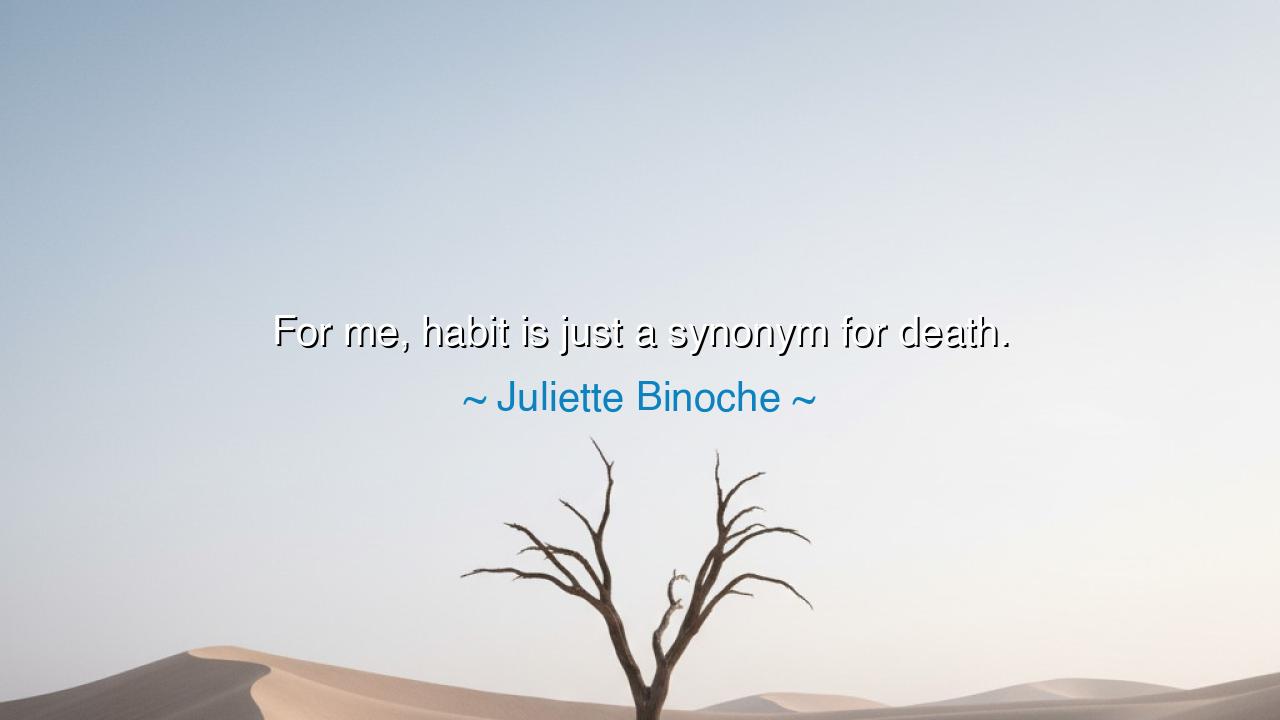
For me, habit is just a synonym for death.






When Juliette Binoche declared, “For me, habit is just a synonym for death,” she spoke not of the body’s end, but of the soul’s quiet burial beneath the weight of repetition. Her words are not a rejection of rhythm or routine, but a warning against the slow erosion of aliveness that comes when a person ceases to feel wonder, ceases to question, ceases to awaken to each moment anew. To her, habit is the shroud that covers the spirit long before the grave claims the flesh. It is the slow surrender of curiosity, the dulling of the fire that once made existence radiant.
The ancients knew this truth well, though they spoke of it in other tongues. The philosophers of Greece warned that stagnation is the enemy of wisdom. To live the same day over and over, unexamined and untransformed, was to step into a kind of living death. For life, they taught, is movement—the flowing river, the shifting wind, the ever-turning stars. To make peace with monotony, to let habit rule the heart, is to deny the divine rhythm of change that animates all creation. In Binoche’s voice, we hear this timeless echo: that true vitality is not in mere existence, but in perpetual becoming.
When an artist speaks of death through habit, she speaks from the battlefield of the soul. Juliette Binoche, an actress of rare depth, has lived her life in pursuit of emotional truth, refusing to become a copy of herself. To her, every role must be a rebirth, every creation a leap into the unknown. The moment one begins to act from formula—from habit—art dies. And so it is with living: when we speak the same words, love in the same way, think the same thoughts day after day, we become statues of our former selves—beautiful, perhaps, but unmoving, unchanging, untouched by growth.
Consider the tale of Prince Siddhartha, who became the Buddha. Born into a palace of endless comfort, his days followed the same rituals, the same pleasures, the same predictable sequence of habit. Yet he found no joy there, only emptiness—a life without meaning. When he stepped beyond the palace gates and beheld suffering, age, and death, the monotony shattered. His awakening began not through comfort, but through disruption. From that moment, he sought liberation not in ease, but in awareness—in the freshness of each breath, each step, each fleeting instant. His journey was the triumph of life over the deathly comfort of habit.
So too in our own age, many live entombed by routine. We wake, we work, we eat, we sleep—forgetting to look at the sky, to listen to the wind, to speak with sincerity. The days blur into one another, and we call it stability. Yet beneath this surface calm, something vital withers: the sense of wonder that makes us human. Binoche reminds us that to truly live, we must resist this quiet suffocation. We must seek out discomfort, risk, creativity, and renewal. For life, like a flame, survives only when it burns.
There is courage in breaking habit. To choose the unknown is to step into the wild, where fear and possibility dwell side by side. But it is there, in the wilderness of uncertainty, that the spirit breathes freely. Whether one is an artist, a teacher, or a wanderer, the call is the same: do not let your life become a repetition. Let it be an unfolding, a song that evolves with every verse. For the measure of a life is not in its length, but in its depth—and depth is born only in the moments when we dare to live differently.
So, children of the restless heart, take this as a sacred counsel: beware the comfort that numbs. When you feel your days growing silent and predictable, when the fire within you flickers low, seek change as the ancients sought wisdom. Travel where you have not gone. Learn what you do not know. Love as if it were your first day on earth. Let no habit harden into a tomb around your soul. For habit is a synonym for death, but curiosity—ah, curiosity is life eternal.






AAdministratorAdministrator
Welcome, honored guests. Please leave a comment, we will respond soon